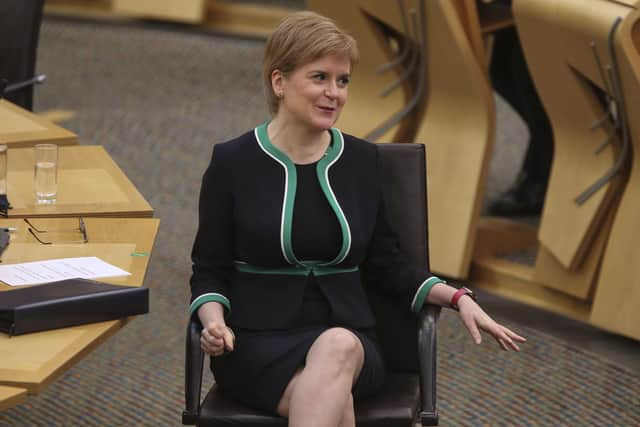Analysis: Trust on domestic issues, not independence, secret to SNP's ongoing success
A new poll from The Scotsman/Savanta ComRes shows support for independence (with don’t knows excluded) at a joint record high of 58 per cent and the SNP set for a commanding single party majority at the Scottish Parliament elections in May.
With 71 nationalist MSPs set to potentially arrive at Holyrood in May, the potential for 11 additional pro-independence MSPs from the Scottish Greens indicates the strength of support for breaking up the union.
Advertisement
Hide AdAdvertisement
Hide AdFor some, the prevailing belief is that support for independence in and of itself is what drives Scottish voters to throw their weight behind the First Minister and her party.


While there is inevitably some truth to that, the reality is the party has a more nuanced support base.
And, in Ms Sturgeon, a politician who consistently flies in the face of conventional wisdom of what should happen to politicians while governing.
Conventional wisdom suggests after 13 years of leading, a combination of institutional fatigue, a lack of new ideas and a natural shift towards change greets politicians before they are ushered out of the door for the next generation.
She is viewed favourably by the majority (net approval of 28 per cent) and is considered more trustworthy (50 per cent of voters), honest (54 per cent), charismatic (53 per cent) and genuine (57 per cent) than any other Scottish political leader, often leading by 30 points or more.
This is not a surprise, but it does indicates the scale of the challenge for unionist party leaders who are also, inevitably, splitting the unionist vote to Holyrood, all while the SNP romp to a 25 point lead over their nearest challengers the Scottish Conservatives.
Ms Sturgeon may be divisive, as 55 per cent of respondents believe, but that clearly doesn’t matter in a post-Brexit, post-Trump world of social media echo chambers.
Advertisement
Hide AdAdvertisement
Hide AdAnd despite U-turns, stuttering education standards, embarrassing health infrastructure delays and expensive failures such as the Scottish Government’s investment in BiFab, the SNP is still the most trusted party in Scotland on all domestic issues.
On healthcare, it is trusted the most by 42 per cent of respondents compared to just 15 and 17 per cent for the Scottish Tories and Scottish Labour.
The SNP lead on education, with 40 per cent trust compared to 15 and 14 per cent respectively and they are trusted more with the economy by 41 per cent of voters to 18 and 15 per cent respectively.
in fact, on every domestic metric other than Brexit, the gap is wider between the SNP and either Labour or the Conservatives than the number of ‘don’t knows’.
With independence sixth on voters’ priority list behind the economy, Brexit, health, jobs and education, and the SNP with 13 years of government behind them, you would expect a closer race in the run up to an election.
Instead this poll underlines the political strength of the SNP and illustrates that while independence drives the SNP’s rhetoric, it is not necessarily driving voters to the SNP.
A message from the Editor:
Thank you for reading this article. We're more reliant on your support than ever as the shift in consumer habits brought about by coronavirus impacts our advertisers.
If you haven't already, please consider supporting our trusted, fact-checked journalism by taking out a digital subscription.
Comments
Want to join the conversation? Please or to comment on this article.